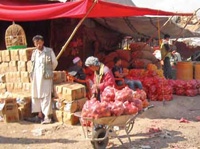Shrinking the Malnutrition Map
FOOD, MEDICINE & HEALTH
As part of a commitment to improve the world’s food supply, IFT recently established global priorities to address contemporary issues that affect the global food supply chain and the emerging science and technology to support this global initiative. Professional partnerships with China and the Latin American and Caribbean Association of Food Science and Technology (ALACCTA) are testament to this commitment to “doing the right thing.”
 As part of our personal and professional dedication to IFT’s global strategic plan and as part of our efforts to establish medical, food, and nutrition stability in underserved populations, we recently visited war-torn Afghanistan. The desolate terrain and expansive evidence of poverty was not unlike what we experienced in South Korea more than 40 years ago. We were particularly struck by the physical presentations of children. As many children rummaged through local garbage dumps and scavenged remnants of food in open-air markets, they appeared small-for-age and often frail. The appearance of the children was not unlike those of children photographed by Cecily Williams in the early 1930s as she confronted the then relatively unknown condition of kwashiorkor in Ghana.
As part of our personal and professional dedication to IFT’s global strategic plan and as part of our efforts to establish medical, food, and nutrition stability in underserved populations, we recently visited war-torn Afghanistan. The desolate terrain and expansive evidence of poverty was not unlike what we experienced in South Korea more than 40 years ago. We were particularly struck by the physical presentations of children. As many children rummaged through local garbage dumps and scavenged remnants of food in open-air markets, they appeared small-for-age and often frail. The appearance of the children was not unlike those of children photographed by Cecily Williams in the early 1930s as she confronted the then relatively unknown condition of kwashiorkor in Ghana.
We noted that the typical playfulness and mischievous sparkle behind the eyes of children were absent. Overt signs of health and vitality of the children were blunted by apparent deficiencies in both macro- and micronutrients. Regions embroiled in conflict, such as Afghanistan, are particularly vulnerable to malnutrition and ensuing illnesses. As western societies attempt to combat obesity, our clinical assessment of caloric deprivation and immunosuppression among Afghan children clearly indicates that these factors contribute to decreased life expectancy in this region of the globe.
There are many opportunities for public health interventions led by food scientists, nutritionists, and physicians. Public health officials queried us on avenues to improve several critical and limiting necessities, namely food and water. Out of the dispersed 15% of Afghan land suitable for farming, less than 6% is actually cultivated; most of the land that is cultivated requires irrigation. Limited Afghan farming produces an array of crops, including wheat and other grains. We were challenged to explore avenues to improve the protein quality of grains, while maintaining palatable and sustainable products. The introduction of soy with wheat does not seem tenable, especially in light of what is already known about the cost-effectiveness of adding lysine to enhance protein quality, particularly important for children, pregnant women, lactating mothers, and those suffering with tuberculosis (TB). TB in Afghanistan is a major public health burden that precipitates nearly 50,000 new cases annually; 70% of those afflicted are women.
Water is another staggering challenge. Surface ditches and underground channels distribute water from springs and rivers. Water quality, however, is uncertain and inconsistent as evidenced by chronic diarrheal disease. Water purification modalities to eliminate waterborne bacteria, viruses, and parasites are needed. Options under consideration include iodinated filtration units, UV treatment, unique membranes, microbial agents, and even novel centrifugation that leverages centripetal forces. Some of these technologies will be implemented soon by the U.S. Army Corps of Engineers.
We simply do not have the luxury of time to address the dynamics of food security. The Food and Agriculture Organization and the World Food Programme have called for a significant rethinking of how food assistance is delivered and food science and technology is applied. Children are sick and dying. We must do something now.
Peter Pressman, M.D.,
Contributing Editor
LCDR, Medical Corps, U.S. Navy, Director Expeditionary Medicine, Task Force for Business & Stability Operations
[email protected]
Roger Clemens, Dr.P.H.,
Contributing Editor
Scientific Advisor, ETHorn, La Mirada, Calif.
[email protected]
